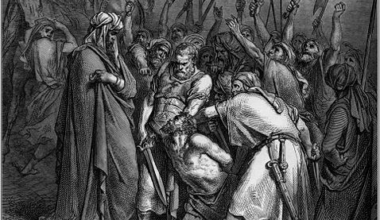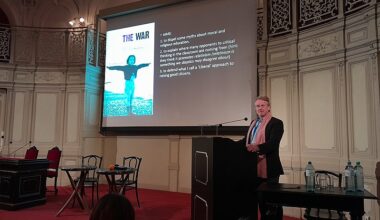
Introduction
As many readers will recall, the phrase ‘canary in a coal mine’ originated from a literal practice used by miners in the late 19th and early 20th centuries in which canaries and other small birds were used to detect dangerous gases like carbon monoxide in coal mines. Since then the phrase has evolved to signal the importance of paying attention to early signs of emerging problems, including ones social and political in nature. But what connection could Israel’s mass slaughter and destruction in Gaza and beyond have to do with this phrase? Obviously, Israel is not literally a canary nor is Gaza a coal mine. Or are they?
To understand this analogy, it is necessary to go back in time, far back to the era tens of thousands of years ago, prior to the agricultural revolution, when the ancestors of all humans on the earth were still tribal hunter-gatherers. It is not difficult to understand the vital importance of the tribe to our forebearers since in the absence of the tribe, individual survival would have been difficult if not impossible. Then, as now, the family would have been the basic social unit but the tribe would have been a very close second.
Today, of course, we generally think of tribal societies as ‘primitive’ and ‘outdated’, without laws or what we today call ‘morality’. This understanding, however, is inaccurate, for tribal societies had moral principles, such as prohibitions against murder, theft, or betrayal within the group. These shared principles reflected the human need for trust and cooperation in small, interdependent communities. However, it is crucial to understand that these moral strictures applied solely to interactions with members of one’s own tribe, i.e., one’s ‘in-group’. For those outside one’s tribe, i.e., the ‘other’, there were no moral strictures. That is to say, ‘anything goes’ (or ‘went’).
Today, of course, most readers would find it well-nigh impossible to identify what tribe they came from. At most they would be able to identify their ethnic group. Although tribes may be considered forerunners of ethnic groups, they are nevertheless significantly different. For example, an ethnic group is a large community of people who share common cultural traits, such as language, religion, ancestry, customs, and traditions. It typically encompasses multiple communities or subgroups, clans, or tribes spread across a broad geographic area whose members are connected by shared identity and culture but may live in different nations or political systems.
A tribe, on the other hand, is a smaller, more localized community that typically has a shared ancestry, language, and territory. Tribes are typically organized around kinship or familial ties and usually have distinct social or political structures such as a chiefdom, council of elders, or clan-based hierarchy. Additionally, tribes typically function as autonomous communities.
Yet, if it can be said that ethnic groups, on the whole, superseded tribes, it is important to note that both tribal and ethnic moral systems aim to ensure social cohesion and survival even though their focus, enforcement, and basis may differ. While tribal morality tends to be localized, pragmatic, and kinship-driven, ethnic morality is broader, influenced by shared cultural or religious narratives, and often more codified. These differences reflect the distinct social scales and organizational needs of tribes versus those of ethnic groups. Nevertheless, ethnic moral systems are built upon, and heavily influenced by, their tribal antecedents.
A further development in social organization has, of course, been the emergence of the nation. Even while, to some degree, retaining their ethnic awareness and identity, many alive today identify primarily, even solely, as a member of their nation. Simply stated, a nation is a group of different ethnic groups who are joined together by a shared, typically political, ideology even though this ideology may also be influenced by a common religious heritage and such things as a common language and cultural norms. The common political ideology, reinforced with shared cultural norms, allows different ethnic groups, including those composed of differing races and religions, to join hands in ever more populous groupings.
Israel as a ‘Canary’
There can be no doubt that the Jewish inhabitants of the state of Israel form an ethnic group: they share a common culture and many, but by no means all, share a common religion, i.e., Judaism. This disconnect is vividly demonstrated in what has become known as the ‘God letter’ written by one of the most famous Jews of the 20th century, Albert Einstein. Concerning his ethnicity, Einstein wrote: ‘I gladly belong [to the Jewish people]…whose mentality I am deeply embedded in.’ Yet, when it came to Judaism, Einstein did not hesitate to write: ‘For me, the unadulterated Jewish religion, like all other religions, is an incarnation of primitive superstition.’
While, no doubt, Einstein’s view of Judaism is a minority opinion among Jews, it demonstrates that shared ethnic identity does not necessarily depend on shared religious orientation even though there may be broad adherence to a common religion by many, even most, members of a particular ethnic group. Thus, when we look at the extreme anti-Palestinian statements made by many of today’s Israeli political leaders we should remember that at most they represent one segment of Israeli society but by no means the whole. If there is hope that Israeli society, like any society, can change, that hope is to be found in this fact.
That said, it would be equally mistaken to assume that the extreme statements of Israeli leaders are a minority opinion that lacks support from a large number, perhaps even a majority, of Israel’s Jewish citizens. It is this support that has, for example, allowed Prime Minister Benjamin Netanyahu to invoke the Biblical image of the Jewish tribal battle against the Amalekites. He claimed Israelis were united in their fight against Hamas, whom he described as an enemy of incomparable cruelty. Israelis, he said, ‘are committed to completely eliminating this evil from the world… You must remember what Amalek has done to you, says our Holy Bible. And we do remember.’
Netanyahu’s reference was to the first Book of Samuel in which God commands King Saul to kill every person in Amalek, a rival tribe to the ancient Israelites. According to the prophet Samuel, God has told the Israelites to ‘go and smite Amalek, and utterly destroy all that they have, and spare them not; but slay both man and woman, infant and suckling, ox and sheep, camel and ass.’ (1 Samuel 15:3)
The tribal nature of Netanyahu and [Yoav] Gallant’s comments could not be clearer; likewise their dismissal of the shared humanity of Israelis and Palestinians.
Likewise, former Israeli Defense Minister Yoav Gallant claimed that ‘We are fighting human animals and we act accordingly.’ While Gallant may have initially been referring to Hamas fighters, he went on to call for the collective punishment of all Palestinians in Gaza, stating, ‘We are imposing a complete siege on Gaza. There will be no electricity, no food, no water, no fuel. Everything will be closed.’
The tribal nature of Netanyahu and Gallant’s comments could not be clearer; likewise their dismissal of the shared humanity of Israelis and Palestinians. It should be underlined that they are members of the ostensibly secular Likud Party, so that despite their appeal to the Hebrew Bible, they are not exemplifying Judaic values. Stripped of any religious conscience, their naked tribalism is astonishingly cruel.
Yet, at the same time, there are Jews, including in Israel, who recognize their shared humanity with Palestinians. Admittedly in Israel itself, groups like Standing Together are few in number. However, among Jews outside of Israel, groups like Jewish Voice for Peace and IfNotNow are much more numerous.
Leading Jewish intellectuals like Yeshayahu Leibowitz, Noam Chomsky, Avi Shlaim, Miko Peled, and Ilan Pappé have long been at the forefront of criticising Israel’s conduct towards the Palestinians. While it is common to describe these groups and individuals as ‘left-wing’ or ‘progressive’, their stances are not so much political as they are a continued recognition of the universal Judaic values of caring for the poor and oppressed, pursuing justice, and treating others with compassion based on their shared humanity.
At this point readers may be thinking, if this analysis is correct, it certainly doesn’t apply to adherents of Judaism only. Don’t all of today’s major religions teach recognition of our shared humanity, the need to be compassionate to others, i.e., some version of ‘do unto others as you would have them do unto you’? In response, I would certainly agree they do. We are fortunate indeed that, at least doctrinally, all of today’s major religions share these basic values. But what of the historical practice of these religions?
Limitations of space don’t allow me to go into detail, so let me give but one example that has particular relevance to the current situation in Israel/Palestine. I refer to the role that the doctrine of ‘Manifest Destiny’ has played in American history. First coined in 1845, this term represented a collective mindset that viewed the expansion of the US as both necessary and ordained by God. As the US gained more territory, proponents of Manifest Destiny used it to justify the forced removal, i.e., ethnic cleansing, and even the wholesale slaughter of Native American tribes in newly acquired territories.
I suggest that the tribal mindset of Christians of European heritage that was manifested in Manifest Destiny is similar to the far-right Zionist commitment to the forced removal and/or elimination of the Palestinian people as part of the current, extremist Israeli government’s drive to create Greater Israel, which it sees as comprising all the lands promised to the Jewish people by the God of the Hebrew Bible.
Compare these actions with the words that both Christians and Jews claim to believe in as contained in the book of Leviticus 19:33-34:
And if a stranger sojourn with thee in your land, ye shall not vex him. But the stranger that dwelleth with you shall be unto you as one born among you, and thou shalt love him as thyself; for ye were strangers in the land of Egypt: I am the Lord your God.
What is one to make of the vast difference between the practice of many Christians and Jews in comparison with the teachings they both claim to believe in? Should their practice be regarded as simple hypocrisy, i.e., do as I say, not as I do? And were there space, I could give similar historical examples from all the major religions of the world. Hypocrites all?
I suggest not. Instead, I point to what is as yet an unresolved split in all world religions, i.e., a split between their tribal heritage, based on tens of thousands of years of history, versus their Axial Age awakening of less than three thousand years ago. The term Axial Age refers to a period roughly between 800 and 200 BCE centred on religious and philosophical developments in Greece, the Levant, India, and China. This period was given its name by the German philosopher Karl Jaspers. Jaspers identified the Axial Age as a worldwide transformation of religious consciousness on the part of religious and philosophical leaders who, independently of each other, came to some similar conclusions.
The present conflict in Israel/Palestine and beyond will no doubt…come to an end, at least this time around. It is safe to say, however, that the battle for the soul of Judaism will continue.
These leaders came to the realisation that truth, whether in the form of the nature of God or philosophical truth, was universal, as were ethical and moral conduct, i.e., no longer limited in validity to one’s tribe and its members. This awakening was of profound importance in that it led to a recognition of the shared humanity of all. This in turn led to a feeling of mutual compassion in which others were recognized as extensions of themselves, extensions who have the same human needs and fears as themselves.
The present conflict in Israel/Palestine and beyond will no doubt claim an as yet untold number of lives, but, at some point, it will come to an end, at least this time around. It is safe to say, however, that the battle for the soul of Judaism will continue. The battle is between those Jews who understand Judaism as a post-Axial Age religion, i.e., concerned with the wellbeing of all humanity, versus those who still cling to a tribal mentality in which the well-being of fellow tribal members is the predominant if not exclusive concern. Inevitably this dichotomy, if unresolved, will lead to further hostilities in the future and yet more bloodshed, possibly even among Jews themselves.
At the same time, we should take hope from the emergence of groups and individuals like those mentioned above who demonstrate that the universal values of the Axial Age are becoming increasingly widely embraced, especially by young Jews living outside of Israel and even some inside of the country. Which side will prevail remains to be seen, yet non-Jews have a role to play in not only opposing tribal-oriented anti-Semitism but also in offering enthusiastic support to those Jews who embrace a Judaism concerned with building a just and humane future for all.
In addition, it is critically important that non-Jews not assume that this is a conflict only involving the Jewish people. As recorded history all too graphically reveals, the struggle between a narrow tribal mentality versus a universal mentality truly accepting of the other is one that transcends all ethnic, racial, national, and religious boundaries.
In the US, the slogan ‘America First’ is currently embraced by many millions, demonstrating that the tribal mentality remains firmly in place. Likewise, we have seen the recrudescence of a narrow Hindu tribalism in the Indian nationalist movement of Hindutva which opposes the presence of non-Indian religions, especially Islam and Christianity, in India. It, too, betrays the Axial Age ethical universalism of Indian Buddhism as well as such Hindu holy texts as the Upanishads and the Bhagavad Gita.
It is also important to realize that as brutal and destructive as religion-endorsed tribal warfare has been in the past, humanity as a whole was not endangered no matter how many hundreds or thousands were killed. Today, however, the use of thermonuclear weapons, some of which are two hundred to five hundred times more powerful than those dropped on Hiroshima and Nagasaki, could plunge the earth into a nuclear winter, resulting in the loss of food stuffs and leading to widespread starvation.
The nuclear-armed states we now have, and even those with extremely powerful conventional weapons, can wipe out entire cities or regions, perhaps even all of humanity, in what has been appropriately named as ‘mutual assured destruction’ (MAD). In the first quarter of the 21st century alone, we have already witnessed the massive destruction resulting from wars in Ukraine and the Middle East, including entire cities in Iraq, Syria, Sudan, and Gaza. The use of atomic bombs on Hiroshima and Nagasaki is but a foretaste of what humankind is now capable of.
The fundamental question facing all of us, as Homo sapiens, is whether we can collectively awake to, and transcend, the historical practices associated with our tribal past.
Thus, the struggle among Jews between those who retain a tribal view of their faith versus those who recognize the wellbeing of the other as a foundational element of their faith is, in fact, the same battle faced by the adherents of all the world’s religions. Even those who identify with no faith would be hard put to demonstrate that the ‘non-religious’ have, by virtue of their lack of faith, made substantial contributions to a peaceful world. Adherents of Islam, Christianity, Hinduism, Buddhism, etc. also face the same dilemma.
The fundamental question facing all of us, as Homo sapiens, is whether we can collectively awake to, and transcend, the historical practices associated with our tribal past. Or are we bound to continue to fool ourselves into believing that we are pursuing universal truth even as we betray such truth in practice? Thus, the ongoing battle in Israel/Palestine is in reality no more, though no less, than the common struggle of all who believe in human equality, dignity, and justice. This struggle now encompasses even the very survival of the human species.
Israel has already contracted private companies specializing in settlement construction to work in Gaza and recruitment for demolition work in Gaza has also begun. The background for this development is acknowledged by former Israeli military Chief of Staff and Defense Minister Moshe Ya’alon. Recently, he said that Israel is carrying out ‘ethnic cleansing’ in northern Gaza: ‘There is no Beit Lahia. There is no Beit Hanoun, they [the IDF] are currently operating in Jabalia and are essentially cleaning the area of Arabs.’ Ya’alon added, ‘I am compelled to warn about what is happening there. War crimes are being committed. Never has a democratic state faced trial at the International Criminal Court in The Hague for such actions.’ Last month, the International Criminal Court issued arrest warrants for Netanyahu, Gallant, and several Hamas leaders (a fact that should give pause to those who claim that Israel is being unfairly treated; one can oppose Israeli crimes at the same time as opposing the terrorist acts of Hamas).
For those who still doubt the extent of Israeli crimes in Gaza, Israeli historian and former IDF officer Lee Mordechai has spent the past year compiling an exhaustively referenced report with all the horrific details in which he concludes that Israel is currently committing genocide; the latest version of the report has not long been released. Reports Nir Hasson of the Israeli newspaper Haaretz:
Even if not each and every one of the testimonies [in Mordechai’s report] can be corroborated, the picture that arises from them is of an army that in the best case has lost control of many units, whose soldiers proceeded to do whatever struck their fancy, and in the worst case is allowing its personnel to commit the most atrocious war crimes imaginable.
‘My role as a historian’, said Mordechai, ‘is to give voice to those who cannot sound their own voices, whether they were eunuchs in the 11th century or children in Gaza.’
As a matter of immediate concern, those who recognize the humanity and equality of all human beings must unite to do everything in our power to peacefully prevent the Israeli government from successfully cleansing even one part of Gaza. Ethnic cleansing in Gaza, or anywhere in the world, can only be prevented if those who undertake this inhumane action are made to recognize that the vast majority of the world’s people will no longer tolerate the pain and suffering imposed on those who are forced to flee their homes and land or be killed if they don’t.
Should we fail to do this, it will not only allow the current ethnic cleansing to be successful in Gaza but will invite more of the same in the future, including the West Bank in Israel/Palestine and beyond. In addition, we need to call on the international community to pressure the Israeli government to end the genocide and release all illegally held Palestinian prisoners in Israeli jails, while continuing to agitate for the release of Hamas-held Israeli hostages in Gaza. Not least, we must call for the rebuilding of Gaza, and, most important of all, the ending of the occupation and the establishment of either an independent Palestinian state or a single state in which all citizens enjoy equal rights.
Those who seek to engage in deeply immoral and inhumane acts, as well as their backers, must be forced to recognize that the peoples of the world will no longer tolerate large numbers of their fellows being subjected to gross mistreatment and abuse, most especially when mass slaughter is now taking place on a daily basis. As the slogan of the Industrial Workers of the World so famously proclaimed in the early 20th century, ‘an injury to one is an injury to all.’
Is Israel a canary in a coal mine? Yes, it most certainly is. A canary whose very existence is being endangered by dangerous gases, but dangerous gases of its own making. The components of these dangerous gases are the policies that Israel is now pursuing: apartheid, ethnic cleansing, and genocide. The great and ironic tragedy is that not only is the canary’s life in jeopardy, but so, too are the lives of the mine’s far more numerous other inhabitants, many of whom are already dead or in the process of dying, including from starvation. It is now abundantly clear that the canary and those under its control are unwilling, if not adamantly opposed, to detoxifying the deadly gases on their own. Never has it been more important for those who seek to save the lives of both the mine’s numerous inhabitants as well as the canary itself to speak out as one in saying: ‘Never again, anywhere, for anyone!’
Related reading
Religion and the Arab-Israeli conflict, by Kunwar Khuldune Shahid
Bloodshed in Gaza: Islamists, leftist ideologues, and the prospects of a two-state solution, by Kunwar Khuldune Shahid
An Islamic (mis)education about Israel, by Hina Husain
Is the Israel-Palestine conflict fundamentally a nationalist, not a religious, war? by Ralph Leonard
Young, radical and morally confused, by Gerfried Ambrosch
How Trump will reshape America’s global role in his image, by Matt Johnson
US Election 2024: Yet Another Farcical and Costly Contest, by Zwan Mahmod
Israel’s war on Gaza is a war on the Palestinian people, by Zwan Mahmod
US Election 2024: On ‘Lesser Evilism’, by Ralph Leonard
Confronting identity politics, a breeding ground for division and dehumanisation, by Maryam Namazie
‘F*** it, think freely!’ Interview with Brian Cox, by Daniel James Sharp
Can Religion Save Humanity? Part Two: Killing Commies for Christ, by Brian Victoria
Britain’s liberal imam: Interview with Taj Hargey, by Emma Park








4 comments
“Ethnic cleansing in Gaza, or anywhere in the world, can only be prevented if those who undertake this inhumane action are made to recognize that the vast majority of the world’s people will no longer tolerate the pain and suffering imposed on those who are forced to flee their homes and land or be killed if they don’t.” – Brian Victoria
Israel was created after Jews had been “cleansed” from most places they had been living. After Israel was created Jews were cleansed from the river to the Sea of Japan. This was followed up by a coalition of five Arab armies attempting to finish the job West of the Jordan – a job which almost everyone thought they would accomplish. They didn’t. Now this mealy mouthed author faults them for defending themselves. Disgusting.
Dear Carl,
Thank you for your comments. Nothing I wrote states that Jews have no right to live in Israel. I do, however, assert that the Palestinian people, like all people living in the land of what is today Israel, also have the same right to live in dignity and freedom, either in one state or two, as the two parties may decide. I can only express the hope that, for the sake of peace and the end of killing, you agree and will join me in working toward that end.
The only obstacle to peace in this particular conflict is the Palestinians’ determination to destroy Israel. To the majority of Palestinians, the existence of a Jewish state on formerly Muslim land is an intolerable blasphemy which must be erased. As Golda Meir said, “If the Palestinians put down their weapons, there would be peace; if the Israelis put down their weapons, there would be genocide.”
Speaking of genocide, the author has clearly bought into the lie this is what is happening in Gaza now. No army in the history of urban warfare has gone to such lengths to avoid civilian casualties and has achieved such low a civilian-to-combatant fatality ratio as a result. This is in spite of the fact that Hamas use human shields by embedding themselves in civilian infrastructure. If Israel had actually wanted to commit genocide in Gaza, it would have been over in an afternoon.
Dear David,
It is heartbreaking to read that you express no remorse, no regret for the deaths of many thousands of children and other non-combatants in Gaza, the West Bank and beyond. Given this, I’m sure there is nothing I could write that would change your mind in this regard. However, when you embrace your own child or grandchild, I can only pray that you will come to the realization of just how precious each life is, regardless of their religion or ethnicity.
Brian
Your email address will not be published. Comments are subject to our Community Guidelines. Required fields are marked *
Donate